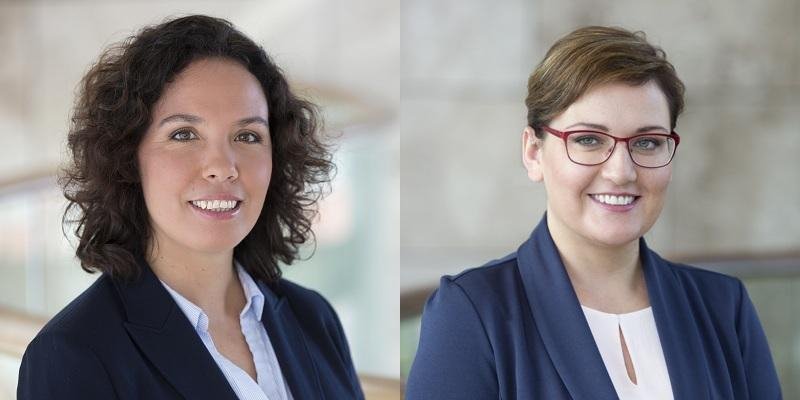Article published by the Dutch Banking Association (in Dutch).
Development bank FMO is not your typical bank—many of its clients are small- and medium-sized enterprises in developing countries. But what’s also unusual is the central role of FMO’s environmental and social officers (E&S officers), Patricia Nicolau and Tatjana Gerling, in using human rights to guide internal decision-making in investment decisions.
In this article, the fifth in the series “Banking and human rights,” Nicolau and Gerling weigh in on the necessity of providing specific and up-to-date advice. After all, today’s risk factors in developing countries may look completely different in five years.

| FMO’s environmental and social officers Patricia Nicolau (l) and Tatjana Gerling (r) |
Tatjana Gerling: “Our customers are often small- and medium-sized enterprises in developing countries. This determines the kind of relationship we have with them, and the personal ways in which we work with them on human rights.” In their role as E&S officers, Nicolau and Gerling use human rights tools to influence decision-making, explains Nicolau: “FMO employs multiple E&S officers in various departments. We ensure that decisions are made from a rights holder’s perspective. A decision to go ahead with a deal is only final once we’re confident that human rights risks have been taken into account and have been mitigated.”
Tool kit for advising clients
Patricia Nicolau: “We build trusting relationships with our clients. This gives us, as a development bank, the opportunity to advise and guide them on certain topics. Human rights is one of those topics. But how do you ensure the advice you’re giving clients is accurate and up to date? To that end, we developed a “human rights tool kit”, a resource FMO colleagues can use to assess potential for human rights risks and advise clients on mitigation measures to ensure human rights are respected and when possible enhanced. The toolkit consists of a series of questions and references to reliable data and sources which allow clients and colleagues to make a human rights analysis for every country and sector, in every step of the investment process.
Gerling was one of the colleagues who began using the tool kit: “The tool kit offers a step-by-step plan for conducting an analysis of local risks faced by an entrepreneur. It helps in looking not only at the client, but also at the social landscape. This allows me to give appropriate advice on the human rights issues in a specific country or region.” Nicolau adds that tailored advice is extremely important: “Solar park projects in Ukraine encounter completely different risks from those in Ghana. It’s important that the entrepreneur is aware of this.”
From minimal effort to a conscious contribution
What drives Gerling and Nicolau is the opportunity to change mentalities. Nicolau explains: “We help our clients think and assess human rights differently. Before they begin working with us, they are mostly only compliant with local laws and regulations. Of course, that is an important starting point, but we help them to go further.” Gerling: “Clients trust us . Once we’ve provided them with insight into local risks and opportunities, we notice within a few years that they’re no longer satisfied with meeting basic requirements. They start viewing human rights in terms of what they can contribute to the local community. By doing this, we simultaneously lower the risk profile of our investment. So, it works both ways.
Specific and up-to-date advice
What are the challenges, according to Nicolau and Gerling? Gerling: “The fast pace of change in today’s world creates challenges. The risks developing countries are currently facing may look completely different in five years. That’s why it’s so important that our advice is specific and up to date.” Aside from this, development banks have only indirect influence, according to Nicolau: “We’re always a step removed from the real “action” and can only contribute to safeguarding human rights through our clients. That is why we regularly visit clients—close cooperation is key. By sharing our knowledge with them, we empower them to make the difference.
Related news:


